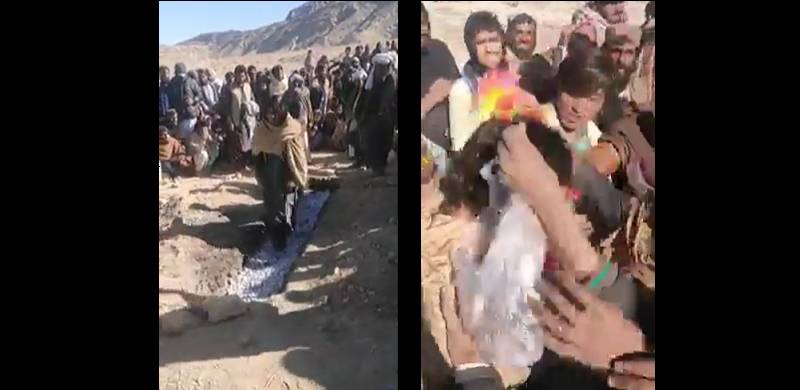
A video showing two young men walking barefoot on hot embers to prove their innocence has gone viral on social media. The footage is from Sanjawi tehsil, Ziarat district in Balochistan province and the two men appear to have been accused of stealing equipment. Authorities in the district have begun an investigation into the incident. According to Assistant Commissioner of Sanjawi, Hassan Anwar, this event took place five days ago in Sira Khezi area near Sanjawi, about 60 km from Ziarat.
The two parties who organised this extraordinary ritual are described as having reached 'mutual consensus' to resolve their dispute in this manner.
One of the men subjected to the ordeal, Gul Zaman, claims that two weeks earlier, some tractors, batteries and generators were stolen from his employers. When he informed the owners, they instead accused Gul Zaman and another employee Mohammad Raza of the theft, while torturing them. The two men were told that the only way to prove their innocence was to walk across hot embers barefoot.
The video shows the two men taking turns to walk across a pit, some 10 to 12 ft long, filled with hot embers. Having succeeded in walking across it, they were apparently acquitted: since those present believed that there were no burns or blisters on their feet. Video footage shows them being embraced and garlanded after their ordeal.
Such a ritualised trial by fire includes an invocation of the Holy Quran and the hot embers are ‘asked’ not to burn the feet of those who are innocent. If a person undergoing the trial gets blistered feet from the ordeal, they are considered guilty of the crime that they stood accused of. Making their way across the pit ‘unharmed’ leads to a verdict of innocence.
The man who organised the ritual, a local named Saifuddin, claims that this event was necessary to avoid violence between the two parties to the dispute. Whereas the owners of the stolen equipment wanted to register a case for theft against the two men, the latter themselves wanted to sue for detention and kidnap.
Saifuddin claims that he organised the ordeal after local authorities including the Levies force did not help with resolving the dispute. He also claims to have informed the district administration as well as the Levies that he was about to proceed with the ritual – without objections from these quarters. In Saifuddin’s version of events, he was asked by both parties to the dispute to resolve it in a traditional ‘tribal’ manner.
The Levies police have denied involvement, rejecting claims that the rival cases were brought to them or that their permission was sought in organising the ritual. Moreover, the Assistant Commissioner of Sanjawi also took the view that the district administration were not informed of the jirga which decided upon this ordeal for the two men.
While no action has yet been taken against the jirga, the District Commissioner of Ziarat has ordered an investigation into whether or not the police had colluded in the ritual.
The two parties who organised this extraordinary ritual are described as having reached 'mutual consensus' to resolve their dispute in this manner.
One of the men subjected to the ordeal, Gul Zaman, claims that two weeks earlier, some tractors, batteries and generators were stolen from his employers. When he informed the owners, they instead accused Gul Zaman and another employee Mohammad Raza of the theft, while torturing them. The two men were told that the only way to prove their innocence was to walk across hot embers barefoot.
The Levies police have denied involvement, rejecting claims that the rival cases were brought to them or that their permission was sought in organising the ritual
The video shows the two men taking turns to walk across a pit, some 10 to 12 ft long, filled with hot embers. Having succeeded in walking across it, they were apparently acquitted: since those present believed that there were no burns or blisters on their feet. Video footage shows them being embraced and garlanded after their ordeal.
Such a ritualised trial by fire includes an invocation of the Holy Quran and the hot embers are ‘asked’ not to burn the feet of those who are innocent. If a person undergoing the trial gets blistered feet from the ordeal, they are considered guilty of the crime that they stood accused of. Making their way across the pit ‘unharmed’ leads to a verdict of innocence.
The man who organised the ritual, a local named Saifuddin, claims that this event was necessary to avoid violence between the two parties to the dispute. Whereas the owners of the stolen equipment wanted to register a case for theft against the two men, the latter themselves wanted to sue for detention and kidnap.
Saifuddin claims that he organised the ordeal after local authorities including the Levies force did not help with resolving the dispute. He also claims to have informed the district administration as well as the Levies that he was about to proceed with the ritual – without objections from these quarters. In Saifuddin’s version of events, he was asked by both parties to the dispute to resolve it in a traditional ‘tribal’ manner.
The Levies police have denied involvement, rejecting claims that the rival cases were brought to them or that their permission was sought in organising the ritual. Moreover, the Assistant Commissioner of Sanjawi also took the view that the district administration were not informed of the jirga which decided upon this ordeal for the two men.
While no action has yet been taken against the jirga, the District Commissioner of Ziarat has ordered an investigation into whether or not the police had colluded in the ritual.

